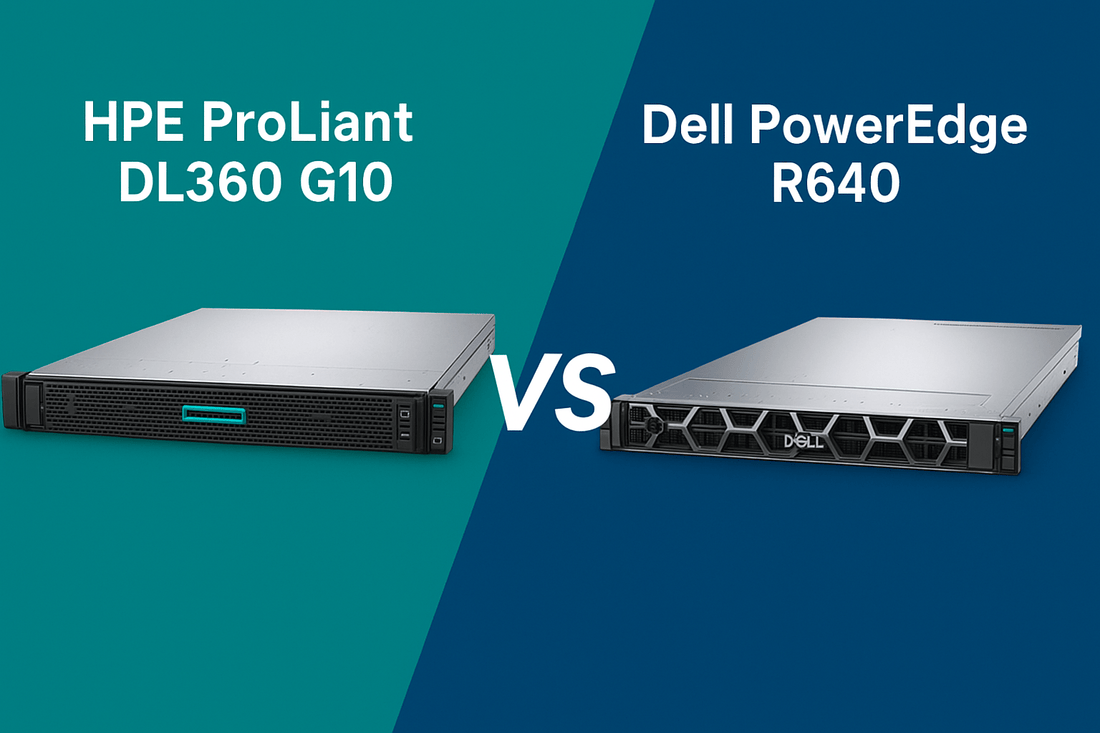When it comes to enterprise-grade servers, the HPE ProLiant DL360 Gen10 and the Dell PowerEdge R640 are two of the most popular 1U rack-mounted options on the market. Both deliver outstanding performance, scalability, and reliability, but each has unique strengths that make it better suited for specific workloads and IT environments. In this post, we’ll break down the key differences between the two and help you decide which server is the right fit for your organization.
Performance and Processor Options
-
-
Supports Intel Xeon Scalable processors (up to 28 cores per CPU).
-
Offers strong compute density for virtualized environments and general workloads.
-
Excellent for businesses that need balanced performance and energy efficiency.
-
-
-
Also supports Intel Xeon Scalable processors (up to 28 cores per CPU).
-
Designed with a focus on performance-heavy workloads such as databases, VDI, and AI/ML applications.
-
Can be configured with more aggressive performance tuning and accelerator options.
-
Verdict: Both servers excel in compute power, but the R640 edges ahead for performance-intensive workloads, while the DL360 G10 balances performance with efficiency.
Memory and Scalability
-
HPE ProLiant DL360 G10:
-
Supports up to 3TB of DDR4 SmartMemory.
-
Flexible configurations for businesses scaling gradually.
-
Advanced memory reliability features to reduce downtime.
-
-
Dell PowerEdge R640:
-
Supports up to 3TB of DDR4 memory as well.
-
Designed with faster memory speeds and more optimized support for high-density applications.
-
Stronger performance edge in virtualization and memory-heavy applications.
-
Verdict: Both support the same maximum memory, but Dell’s R640 typically offers better optimization for workloads that demand more memory bandwidth.
Storage and Expansion
-
HPE ProLiant DL360 G10:
-
Supports up to 8 SFF (2.5"), 10 SFF (2.5”) or 4 LFF (3.5”) drives.
-
Flexible drive options make it ideal for organizations with mixed storage needs.
-
Integrated with HPE’s Smart Array controllers for RAID flexibility.
-
-
Dell PowerEdge R640:
-
Supports up to 10 NVMe drives, giving it a significant edge in high-performance storage.
-
Optimized for all-flash configurations and software-defined storage.
-
Uses Dell’s PERC RAID controllers and optional HBA adapters for flexible configurations.
-
Verdict: If your workloads demand NVMe or flash-heavy storage for databases, VDI, or analytics, the R640 is the stronger option. For mixed or traditional storage needs, the DL360 G10 is more cost-effective.
Management and Security
-
HPE ProLiant DL360 G10:
-
Integrated with HPE iLO 5 for remote management.
-
Silicon Root of Trust provides advanced firmware protection.
-
Strong focus on automated server management.
-
-
Dell PowerEdge R640:
-
Features iDRAC9 with Lifecycle Controller for remote management.
-
Cyber-resilient architecture with automatic firmware verification.
-
Seamless integration with Dell OpenManage for enterprise-level IT operations.
-
Verdict: Both excel in security and remote management. HPE emphasizes automation, while Dell offers broader ecosystem integration for large-scale deployments.
Cost and Use Case
-
Choose HPE ProLiant DL360 G10 if:
-
You want a reliable, efficient server for general-purpose workloads.
-
Your IT strategy emphasizes cost-effective scalability.
-
Energy efficiency and ease of management are top priorities.
-
-
Choose Dell PowerEdge R640 if:
-
You run performance-intensive workloads (databases, VDI, AI/ML).
-
Your business requires high-speed NVMe storage.
-
You want stronger optimization for virtualization and dense compute environments.
-
Final Thoughts
The HPE ProLiant DL360 G10 is an excellent all-around enterprise server that delivers balanced performance, strong security, and cost-effective scalability. It’s a great choice for organizations with mixed workloads and steady growth. On the other hand, the Dell PowerEdge R640 is engineered for high-performance, data-heavy applications where speed, storage flexibility, and memory optimization are critical.
Ultimately, the choice comes down to your workload needs: if efficiency and flexibility matter most, go with HPE; if you need cutting-edge performance and NVMe capabilities, Dell is the winner.





